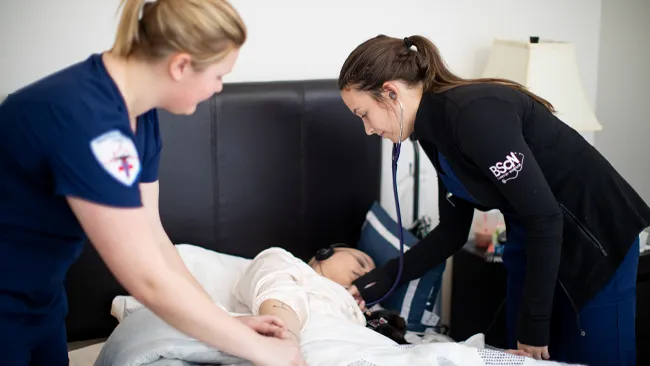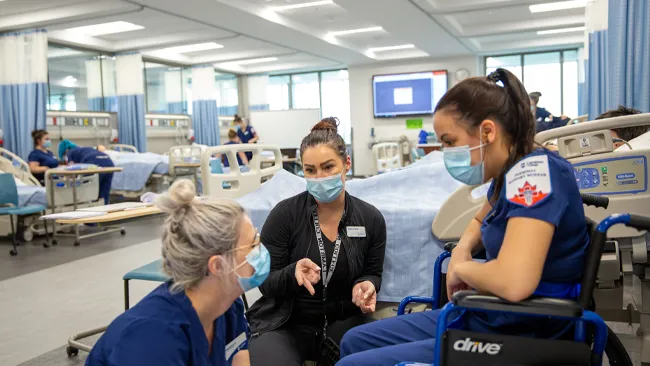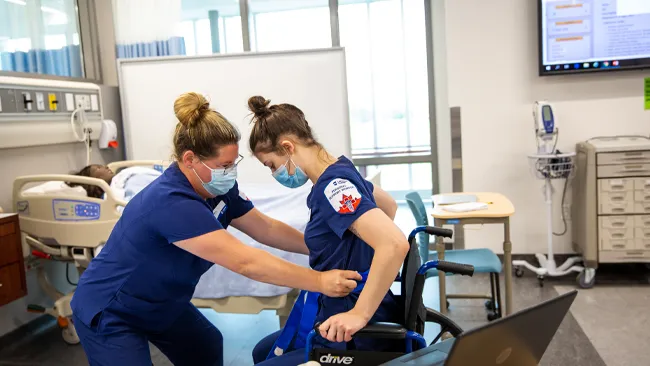
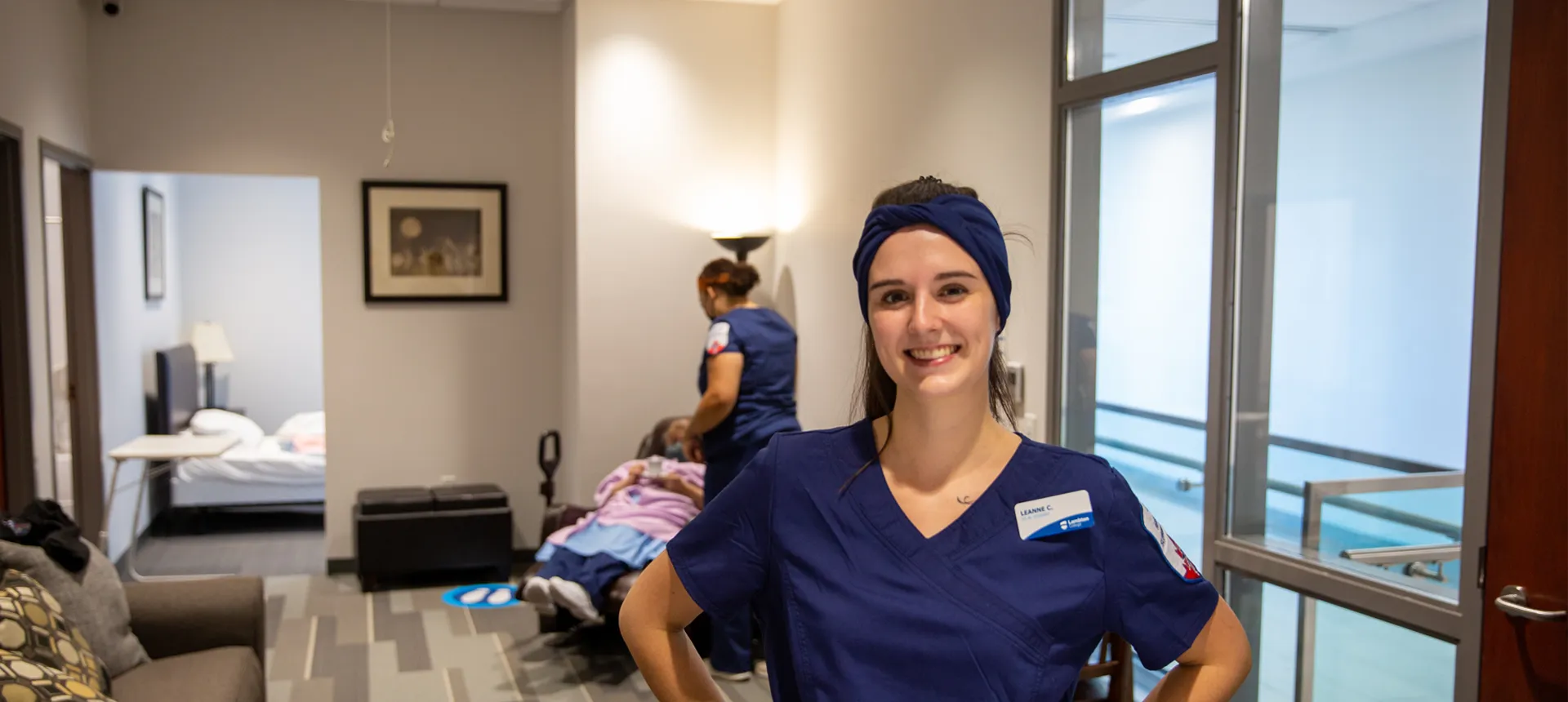
Personal Support Worker - Pre-Practical Nursing Pathway
Overview
Become a valued member of the ever-evolving health care team in Canada as a Personal Support Worker who is in high demand in long term care facilities, retirement homes, home care settings, and hospitals.
This program is designed for students who are interested in eventually applying to the Practical Nursing program. Graduates of the Personal Support Worker - Pre-Practical Nursing Pathway who have achieved a grade of B in all courses and have one year of work experience as a Personal Support Worker (or 1,000 hours) are eligible to apply to Lambton College's Practical Nursing program.
During this one-year certificate program, students learn how to provide care and assistance to clients of any age who have defined health care needs including help with daily living activities. Through theory classes and experiential learning opportunities - like simulations and clinical placements - students learn to make a difference in the lives of their clients by alleviating loneliness, providing empathy, ensuring comfort, encouraging independence, and promoting self-respect in all health care settings.
Admission Requirements
O.S.S.D. or equivalent with:
- Grade 12 English C or U
Mature Student Assessment for this program is available in the subject of English for the purpose of demonstrating proficiency in this required admission subject. For all other admission requirements, applicants must complete the required course(s) as listed above. For more information, please contact counselling@lambtoncollege.ca. Review the Mature Student Admission process.
Academic admission requirements can be obtained through Academic Upgrading and the Pre-Programs at Lambton College.
Incentive Funding for PSW Students
Ontario is providing incentive funding to attract personal support workers (PSWs) to work in long-term care homes as well as home and community care agencies. Available funding provides:
- Up to $5,440 to PSW students as a stipend during their clinical placement in a long-term care home or for a home and community care employer (please be aware, this has to be applied for by the employer);
- $10,000 to recent PSW graduates in exchange for a 12-month commitment to work in a long-term care home or for a home and community care employers; and,
- An additional $10,000 to support relocation costs for those recent PSW graduates committing to work in a long-term care home or with a home and community care employer in a rural, remote, or northern area for 12 months.
Funding to PSWs and PSW students is provided through long-term care homes and home and community agencies participating in the program. Ontario Health can connect student to participating employers and keep them up to date on incentive funding, job search support, and program updates.
Already working as a PSW?
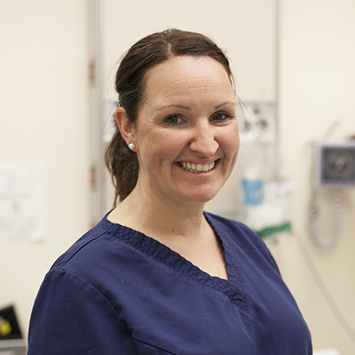
If you're currently working as a PSW and interested in furthering your education to qualify for admission to the Practical Nursing program, Lambton College may have an option for you.
Our Personal Support Worker to Practical Nursing Pathway is a bridging option that provides flexible options to working PSWs who are are interested in pursuing the Practical Nursing career path.
Costs
- Year 1 $4,124.34
Please Note: These fees apply to the 2024-2025 academic year and are subject to change. Fees do not include books (unless specifically noted), supplies or living costs.
Additional Fees
-
Textbooks$300.00
-
CPR & First Aid$165.00
-
Mask Fit Testing$40.00
-
Name Tag$15.00
-
Uniforms (2)$180.00
-
Duty Shoes$100.00
-
Watch - with second hand$40.00
-
Uniform Iron Badge (2)$10.00
-
CompTracker - program for clinical$110.00
-
GPA Training$25.00
-
Lab kit$10.00
-
Police Records Check, Vulnerable Persons Check - annual fee$40.00
-
Non-Violent Crisis Intervention Training$50.00
Travel to Clinical
Students are responsible for all costs associated with traveling to clinical placements. While not required, it is beneficial for students to have a valid G license and access to a personal vehicle for the clinical portion of the program.
Passport to Placement
Students are responsible for all costs associated with passport to placement. Please see Field & Clinical Requirements on mylambton.ca.
Scholarships Available
There are 14 scholarships available for this program, with a total value of $3,650!
Technology Requirements
In order to keep pace with the requirements of each and every course in your program, Lambton College requires that each student have access to a laptop while studying at our college.
Labs & Equipment
Courses
Critical Thinking & Writing
In this writing course, students respond to current issues and news articles via various styles of paragraphs and essays. Students practice thinking critically and organize and hone their writing to ensure clarity and correctness in their messages. Students explore different perspectives, and through synthesis, analysis, and response, strive for clarity of message and diplomatic expression of opinion based on fact. One of the pillars of Lambton College is a commitment to sustainability and equity, diversity, and inclusion, including Indigenization of the curriculum; where appropriate, readings in this course will reflect this commitment. Critical Thinking and Writing lays the foundation for a subsequent research-writing course.
Interprofessional Perspectives
As a new student to a health care profession this course introduces you to the workings of interprofessional teams. It allows learners to gain knowledge with and from students of various programs about several different health care professions. Concepts of teamwork, conflict resolution, the health care system and ethics will be presented through a unique interprofessional delivery model.
Client Care Issues
In this course, the students are introduced to the role of the Personal Support Worker (PSW) including professionalism and their scope of practice within the health care system. Confidentiality and privacy, client rights and responsibilities, ethical issues, and legislation involving the health care system will be explored. Students will also be introduced to caring for clients with dementia.
Ongoing Health Conditions I
This course introduces the student to the experience of living with ongoing health conditions. The role of the PSW is enhanced through gaining an appreciation for the client experiencing these conditions. Nutrition and infection control interventions provide a framework for enhancing the health of individuals with ongoing health conditions throughout the lifespan.
Anatomy & Physiology
This course introduces the student to the human body and how it functions. The content is concentrated on cells, tissues, organs, and systems and how the systems work together for human survival. The study of the normal aging process of the systems is emphasized.
Clinical Skills Theory
This course provides theoretical content instructions for clinical skills, followed by the four-hour clinical skills lab. In this course, the student will be able to describe important concepts needed to provide compassionate care in the clinical setting. The student will gain knowledge in safety considerations as they learn methods of assisting clients with positioning, activity, exercise, mobility, hygiene, and grooming, assisting with feeding, elimination, medications, and household management. Students will learn about the role and responsibility of the PSW in observing, reporting, and documenting care as per their employer policy. Students will gain the theoretical knowledge needed to take a temperature, radial pulse, respiratory count, oxygen saturation and an electronic blood pressure. Theoretical knowledge relating to household management will also be covered in this course. Infection control principles will be threaded through all areas of material covered.
Clinical Skills Lab
This course will consist of four hours of practical experience in a Lab practicum. The student will demonstrate concepts of compassionate, client centered care as they learn the skills that are needed to safely support individuals with their activities of daily living needs in a facility and or community setting. Students will master the skills to safely assist individuals with positioning, activity, exercise, mobility, hygiene, and grooming, assisting with feeding, elimination, medications, and household management. Students will practice measuring temperature, radial pulse, respiratory count, oxygen saturation and electronic blood pressure. Students will have the opportunity to utilize skills in the community simulation environment. Infection control measures will be threaded throughout each skill learned.
Introduction to Mathematics
This course provides the learner with a fundamental understanding of mathematical concepts. This course reviews and enhances topics in arithmetic, algebra, logarithms, graphs, measurement, and trigonometry. It also teaches the student optimal use of a scientific calculator.
Palliative Care
This course is a study of the client and the role of the Personal Support Worker in palliative care. This course will provide the successful student with the Fundamentals of Palliative Care equivalency certificate. The Fundamentals of Palliative Care is an introductory education program based on foundational concepts from A Model to Guide Hospice Palliative Care: Based on the National Principles and Norms of Practice (Ferris et al., 2002). The course is offered with the permission of the Southwestern Ontario Hospice Palliative Care Education program to Lambton College PSW students. The goal is to provide learning opportunities for formal care providers and provide the best practices in end-of life care to persons and families in Ontario.
Ongoing Health Conditions II
In this course, students will be prepared to identify and implement strategies to care for clients living with mental illness, substance abuse and cognitive impairment. Utilizing selected evidence-based frameworks and supportive care strategies, students explore ways by which personal support workers provide holistic and emotion-based care. Students are encouraged to reflect on their personal feelings, experiences and reactions surrounding mental health.
Career Development
This course provides the student with the opportunity to develop skills to obtain and maintain employment as a Personal Support Worker in a variety of clinical settings. This course provides students with an opportunity to develop skills, tools, and strategies needed to gain meaningful employment as a Personal Support Worker.
Health & Development Across the Lifespan
This course is designed to introduce students to both physical and psychosocial aspects of growth and development from the time of conception through to late adulthood. The role of a Personal Support Worker at the different stages of human life will be discussed. Students will identify normal aspects of each stage so they may recognize any abnormalities that require reporting to their supervisor or registered staff to assure appropriate, timely care interventions. Common childhood illnesses, immunizations and developmental disorders will be reviewed. In addition, students will also be introduced to Maslow, Erickson, and Piaget's developmental theories with a focus on culturally sensitive, family-centred care, emotional support, and safety.
Clinical Practice (2 days/wk for 9 weeks)
Students will obtain clinical experience in a long-term care home. Emphasis is placed on assisting clients to perform their activities of daily living and enhancement of quality of life. This experience is under the supervision of a clinical instructor. Gentle Persuasive Approaches workshop will be included in this course.
Pre-Graduate Clinical (5 weeks - full-time)
PSWC 3006 is a clinical course that includes a preceptor experience. Preceptors are expert Personal Support Workers who are assigned to a student on a one-to-one basis to facilitate the student's transition into their new role as independent novice practitioners.
Contact
Program Information
School of Nursing
After Graduation
Employment Opportunities
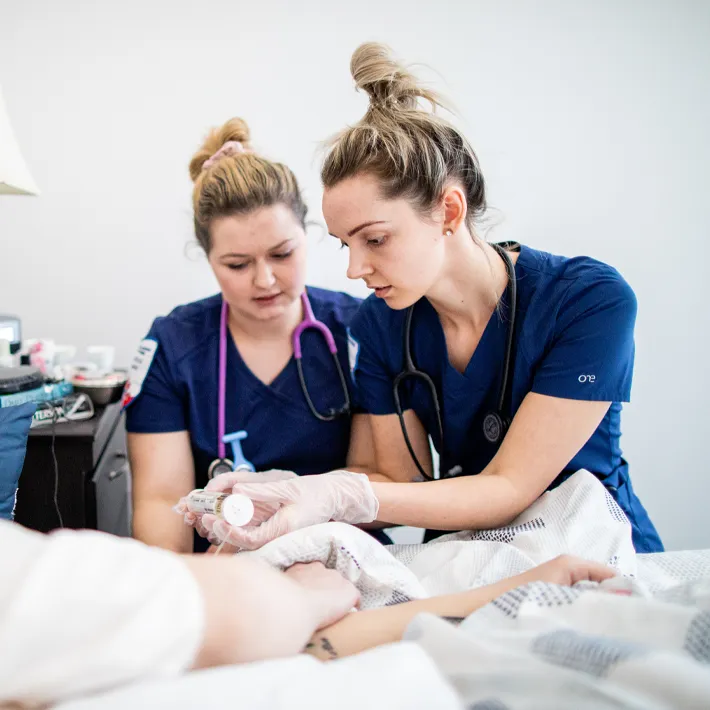
Begin a rewarding career as a personal support worker in community health care, long-term care homes, retirement homes and hospitals in less than a year. As the industry continues to grow and the demand for personal support workers increases, you can feel confident about your job opportunities post-graduation. At this time, there is a high demand for personal support workers and opportunities for local jobs.
Accreditations & Certifications
Fundamentals of Hospice Palliative Care Certificate
Students will receive the Fundamentals of Hospice Palliative Care certificate upon completion of all the requirements in the PSW-2003 course, taken in Term 2. The concepts delivered in the course have been developed by the Palliative Pain & Symptom Management Consultation program, Southwestern Ontario. This certificate is recognized by community partners who deliver home and in-residence palliative care support. Read more about this certification.
Gentle Persuasive Approaches Certificate
Two certified Gentle Persuasive Approaches coaches will provide training for students as part of PSWC-2006 in Term 2. Learn more about the Gentle Persuasive Approach from the Advanced Gerontological Education website.
Non-Violent Crisis Intervention Certificate
As part of PSW-1014 students will earn a certificate in Non-Violent Crisis Intervention from the Crisis Prevention Institute. Students learn under the guidance of a certified instructor who will teach verbal and non-verbal modalities to decrease the risk for those in care as well as caregivers during a crisis. Our community partners value this added certification.
Placement

Vaccinations & Police Record Checks
Students considering this program should be aware that there may be field and clinical placement requirements. Many placements require students have proof of certain vaccinations and police record checks.
Once you’ve applied, you can log in to mylambton.ca and view the program-specific Field & Clinical Placement Requirements. If you need information about these requirements before applying, please contact placementinfo@lambtoncollege.ca.
More Information
Skill Demands
This program demands a high level of physical fitness. Good general health is required including the ability to lift and manipulate heavy weight. Some students with disabilities may require academic accommodation to equalize opportunities to meet the academic demands of a course or a program.
Technology Requirements
It is recommended that students purchase a laptop with a Windows operating system.
Internet Speed Requirements
For best performance for students learning remotely, an internet connection with a minimum of 40 Mbps download and 10 Mbps upload speed is recommended in order to effectively use video conferencing and remote lecture delivery software as well as, other online resources remotely. Due to the large area over which students may be dispersed, we are unable to recommend a specific provider, so you will need to inquire around your area to find one that best suits your needs.
Minimum Laptop Requirements
In order to access the internet and virtually-delivered software and courseware, student laptops should include the following at a minimum. By meeting the following specifications, students will be equipped to access software and courseware on their laptop through the internet:
- Intel i5 8th Gen Processor or equivalent
- 16 GB of RAM (with a minimum of 8 GB)
- 100 GB HDD or more
- HD Graphics
- Webcam with a microphone
- Wireless 802.11n/ac 5ghz capable
- Windows Operating System (Windows 11)
Please note that Chromebooks and MacBooks may not support all software required for your program; students should verify compatibility with their professors.
Software
To ensure students are getting the most our of their classroom experience, some software will be required.
Lambton College has made this software easily accessible online. Students can leverage our Microsoft Office 365 software packages and services. In addition, much of the software you require for your courses will be available on demand for use on any device - on or off campus.
